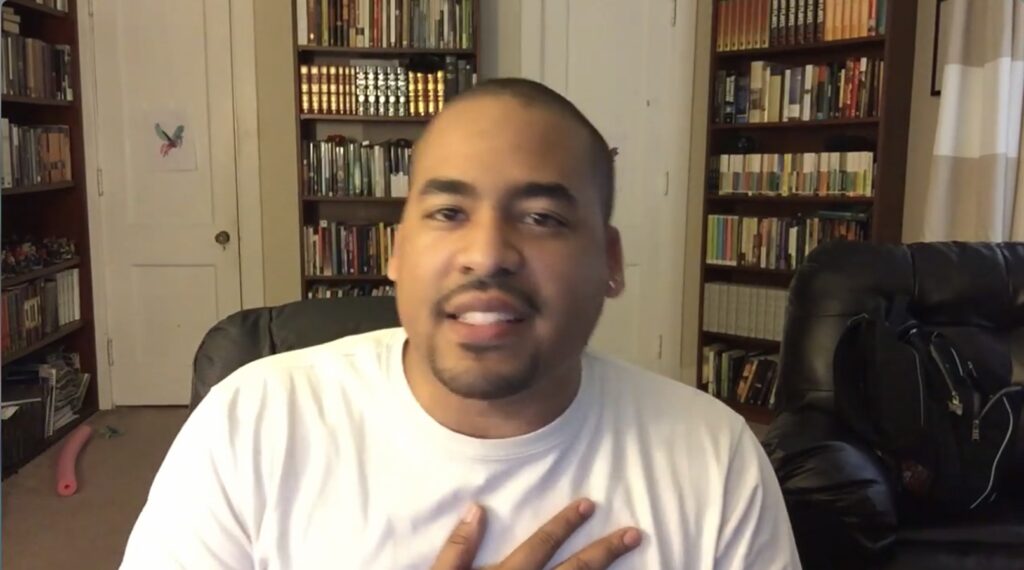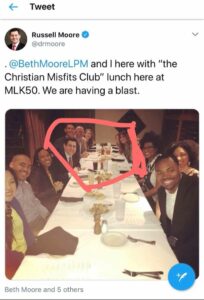Author’s Note: Last week, a controversial tweet was sent from the Pulpit & Pen twitter account which included a cartoon caricature of Kyle Howard. This post was planned in advance of that tweet and is unrelated to its submission or the negative reaction it received.
Kyle J. Howard is a self-described “racial trauma” counselor. To his credit, he holds a degree in Biblical Counseling from Boyce College. By virtue of this education, Howard has completed a program that meets the training requirement for certification with the Association of Certified Biblical Counselors. However, “racial trauma counseling” is not a subject Howard learned about in his training at a Christian college. Rather, it is a field of Howard’s own creation. By Howard’s own admission, his new field of counseling “is foreign to the Biblical Counseling community” of which he has been a part.
On his website, Howard has solicited donations to support his racial trauma counseling activities. According to Howard, he does not charge his racial trauma counseling clients for his services or resources. Thus, on the surface, Kyle Howard is a generous lay minister providing free services to the traumatized. However, once the legal and biblical environments of counseling are examined, it is apparent that Kyle J. Howard is essentially a heretical quack with a dubious background story.
Legal and Ethical Issues
There is nothing in his self-published biographical information or at the Association of Certified Biblical Counselors website to indicate that Kyle J. Howard has ever obtained a certification from that organization. Furthermore, professional counseling is a state-regulated industry in both Howard’s home state (Georgia) and state of residency (Kentucky). To be a licensed professional counselor in either state requires certain levels of post-graduate education and supervised experience that Kyle Howard does not apparently have. Howard is not a professional counselor and cannot, therefore, legally offer professional counseling services for a fee. Were he a professional counselor, there would be the ethical issue with regards to treating “racial trauma” with psychotherapy. According to the American Counseling Association:
The Diagnostic and Statistical Manual of Mental Disorders (DSM-5) does not list racial trauma or race-based stress as a disorder or mental illness.
Even Howard acknowledges that formal racial trauma counseling is a novel practice. He wrote on his website:
Racial trauma was not something I learned about in my counseling degree program and it was not something that was talked about among the minority community groups I belonged to as a multi-ethnic African American. I searched and searched for data about racial trauma and I came up empty. It was at that point, that I began to tap into my historical theology background and begin to reflect on the African American experience in America in a fresh new way. I studied the history of the black experience and the reality of racialization in America and I walked away with the building blocks for a new counseling need that was foreign to the Biblical Counseling community I was apart of, racial trauma counseling.
One should expect new areas of counseling and psychotherapy to be pioneered by seasoned professionals possessing doctoral educations who have provided and analyzed years and years of peer-reviewed research. Kyle Howard is a seminary student whose (self-proclaimed) previous experience includes “rap battling” and lay counseling at his local church. Howard clearly cannot present racial trauma counseling as a legitimate professional and psychological pursuit. Thus, he must ask people on the internet for donations to support his work. Engaging in such pursuits professionally would leave Howard subject to prosecution from regulating authorities. Plainly and simply, “racial trauma” counseling is quackery.
Biblical Issues
Some might still ask, “What about racial trauma counseling from a Christian ministry perspective? Does it have some relevance to ministry?” Experts in the secular field of psychology often run afoul of biblical truth. While the world may value the prevailing opinions of psychotherapists over Biblical wisdom, the church must not. Biblical counseling is set apart from secular psychotherapy and no pastor or member of a local church requires a certification from an outside authority to provide wise counsel in the Kingdom of God. So to answer the questions posed above, one must turn not to state statutes and professional literature but to the holy scriptures.
This is precisely what is done at colleges like Boyce as Christian faculties formulate biblical curricula and teach them to Christian students. As Howard himself admits, he found no reference to racial trauma counseling during his formal studies. This is not surprising because the idea of “racial trauma” within the church is not consistent with a Christian worldview. The biblical record is clear. First, the church is composed of people of multiple national and cultural backgrounds (Revelation 7). Second, all of those individuals of differing ethnicities become one people, God’s Israel, in Christ (Galatians 3). Within the church, societal divisions based on ethnicity and gender are eliminated. Where race is concerned, every man and woman (elect or non-elect) is descended from Adam and Eve (Acts 17). What the world identifies as racial differences are, though very pertinent to history and culture, artificial. There is only one race, the human race, and each member of this race shares the same basic problem: sin. Basing biblical counseling upon racial divisions and focusing it upon racial reconciliation is in itself divisive. Doing so builds, rather than tears down, the artificial edifice of racial separation. This is not to say that Christian counseling should not be focused on reconciliation. To the contrary, it should be. However, theologically sound reconciliation-focused counseling identifies the primary problem of the counselee as rooted in the Fall. In the Fall, mankind became alienated from both God and neighbor. By being reconciled to God (through Christ), man can then see clearly to be reconciled to his neighbor. This Christian concept goes a long way towards repairing and restoring damaged relationships (which is a common end of church-based counseling). Racial trauma counseling, inside or outside the church, is ultimately based on an unhelpful and unbiblical concept. It is at best a gross perversion of the type of reconciliation-focused counseling taught by Christian schools. That Kyle Howard receives internet patronage to push his divisive brand of Christian thought is tragic.
A Suspect Testimony
Whether it be psychological or theological, it has been well established by the arguments and observations above that Kyle Howard engages in quackery, but does he also engage in deception? Howard’s personal testimony, as shared both on his podcast and various website profiles, is incredible. Howard was raised in a two-parent household in the Atlanta area and his parents are both attorneys. According to Howard, his father is a former Methodist minister turned skeptic. He was not, therefore, raised in what would be called a “Christian home.”
Despite his stable home life (Howard tells one anecdote which is downright Cosbyesuqe), Howard claims to have fallen in with the Shotgun Crips gang. He was “beaten in” to the gang at fifteen years of age. On one occasion he nearly murdered a classmate (this story is similar to one told by Ben Carson) who disrespected his gang bandanna with the razor blade he kept in his mouth (he didn’t have his .38 pistol at school that day). Despite the fact that the only way to exit gang life (according to Howard) is death, Howard was able to leave the gang behind and focus on the pursuit of his then girlfriend now wife. Howard was able to achieve a safe exit from gang life, he claims because essentially every member of his set was either incarcerated or dead. Despite only showing up for school for tests, Howard was able to graduate high school and enroll in college. Having left gang life behind, Howard became a professional battle-rapper. He was even offered recording contracts but he turned them down due to artistic concerns. He was able to achieve success in the rap business, a business which requires skills in speaking, despite having a pronounced speech impediment. Eventually, Howard came to Christ through the witness of a Christian rapper he met on his college campus.
Howard’s conversion testimony includes charismatic accounts of visions and prophecies about his future in ministry. He then became a reformed Christian through reading the Bible. He left his word of faith church, went to work for the HeartCry Missionary Society in Alabama, and ultimately chose to enroll in Boyce College and later the Southern Baptist Theological Seminary where he now resides with his wife and three children.
Vouching for Kyle
Frankly, Kyle J. Howard’s personal testimony rivals that of Ergun Caner. I suspect it to be just as fake. Can anyone vouch for Kyle’s wild claims? If you can, write to me at [email protected]. Are you a fellow gang member who can vouch that Kyle was a Crip with you? If you are still alive, please write to me. Are you the young man whom Kyle almost murdered with a razor blade? Please contact me. Are you the Christian rapper who led Kyle to Christ? Please write to me. Did you go to high school with Kyle and can verify that he was a gun-toting violent criminal? Please write to me. Have you ever worked with Kyle? Please write to me. I’m interested to know how a full-time seminary student and father of three who spends much of his day on Twitter manages to support his family on a daily basis. In his incredible testimony, Kyle Howard has provided much in the way of drama and intrigue but very little in the way of names, dates, and places.
Why Focus on Kyle J. Howard?
At this point, one might be wondering why I chose to write about an obscure seminary student and podcaster named Kyle J. Howard. The world is full of hacks and quacks, many of whom are much more prominent than Howard. This is true. However, Howard has been seen associating with some of the most famous, influential, and dangerous people in evangelicalism today – most notably Russell Moore, Beth Moore, and Matt Chandler.
Kyle Howard isn’t becoming more popular by some accident. I, for one, am more than a little “woke” about it.
*Please note that the preceding is my personal opinion. It is not necessarily the opinion of any entity by which I am employed, any church at which I am a member, any church which I attend, or the educational institution at which I am enrolled. Any copyrighted material displayed or referenced is done under the doctrine of fair use.












